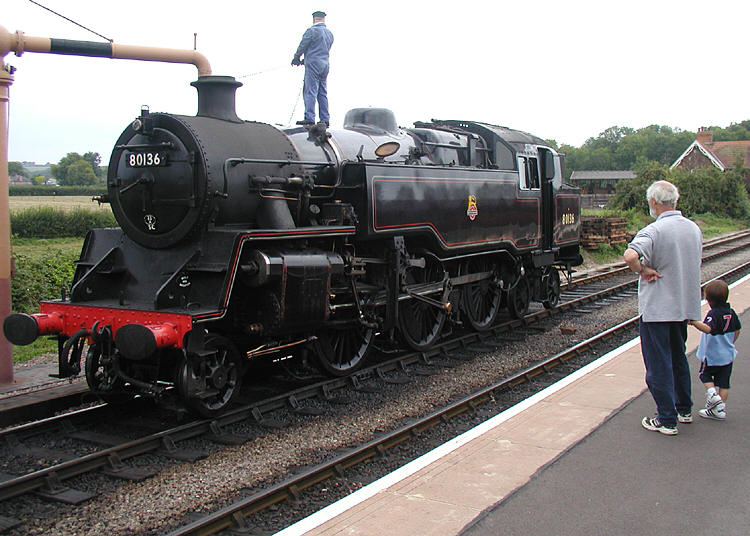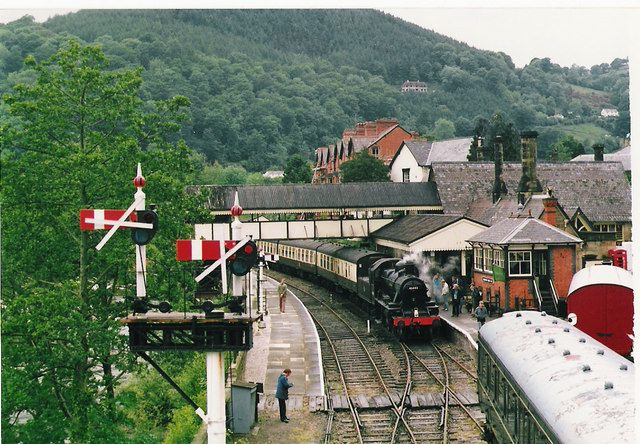|
Llangollen And Corwen Railway
The Llangollen and Corwen Railway was formed as a continuation of the Vale of Llangollen Railway to continue the line along the Dee Valley a further to Corwen. This was opened on 1 May 1865 and was worked by the Great Western Railway and subsequently the Western Region of British Railways. It survives today, and is operated as the heritage Llangollen Railway. References See also *Ruabon to Barmouth Line Ruabon ( cy, Rhiwabon ) is a village and Community (Wales), community in Wrexham County Borough, Wales. The name comes from ''Rhiw Fabon'', ''rhiw'' being the Welsh word for "slope" or "hillside" and ''Fabon'' being a mutation from Mabyn, St M ... Railway lines in Wales Early Welsh railway companies Railway lines opened in 1865 {{UK-rail-transport-stub ... [...More Info...] [...Related Items...] OR: [Wikipedia] [Google] [Baidu] |
Vale Of Llangollen Railway
The Vale of Llangollen Railway was built as a spur from the Shrewsbury and Chester Railway south of Ruabon to the town of Llangollen. The line was built along the northern side of the Dee Valley and authorized by an Act of Parliament on 1 August 1859. It was initially opened for goods only on 1 December 1861 and to passenger traffic on 2 June 1862, and was worked from the outset by the Great Western Railway. The line ran from Llangollen Line Junction (0 miles 54 chains) and served Acrefair, Trevor (and Sun Bank Halt from 1905), before terminating at a temporary station in the east of Llangollen. In 1865 the line was extended by another Great Western Railway-backed line, the Llangollen & Corwen Railway, with the line using a new permanent station in Llangollen. The Vale of Llangollen Railway Company was amalgamated with Great Western as from 1 July 1896 by means of the Great Western Railway (Additional Powers) Act 7 August 1896. [...More Info...] [...Related Items...] OR: [Wikipedia] [Google] [Baidu] |
Corwen
Corwen is a town and community in the county of Denbighshire in Wales. Historically, Corwen is part of the county of Merionethshire. Corwen stands on the banks of the River Dee beneath the Berwyn mountains. The town is situated west of Llangollen and south of Ruthin. At the 2001 Census, Corwen (community and ward) had a population of 2,325, decreasing slightly from the 2001 population of 2,398, The community, with an area of , includes Corwen and the surrounding villages of Carrog, Clawdd Poncen and Glyndyfrdwy. The Office for National Statistics identifies Corwen Built-up area with a 2011 population of and an area of . History Corwen is best known for its connections with Owain Glyndŵr, who was proclaimed Prince of Wales on 16 September 1400, from his nearby manor of Glyndyfrdwy, which began his fourteen-year rebellion against English rule. A statue of Glyndŵr by the sculptor Simon van de Put was installed in The Square in Corwen in 1995, and in 2007 it was replaced ... [...More Info...] [...Related Items...] OR: [Wikipedia] [Google] [Baidu] |
Great Western Railway
The Great Western Railway (GWR) was a British railway company that linked London with the southwest, west and West Midlands of England and most of Wales. It was founded in 1833, received its enabling Act of Parliament on 31 August 1835 and ran its first trains in 1838 with the initial route completed between London and Bristol in 1841. It was engineered by Isambard Kingdom Brunel, who chose a broad gauge of —later slightly widened to —but, from 1854, a series of amalgamations saw it also operate standard-gauge trains; the last broad-gauge services were operated in 1892. The GWR was the only company to keep its identity through the Railways Act 1921, which amalgamated it with the remaining independent railways within its territory, and it was finally merged at the end of 1947 when it was nationalised and became the Western Region of British Railways. The GWR was called by some "God's Wonderful Railway" and by others the "Great Way Round" but it was famed as the "Holiday ... [...More Info...] [...Related Items...] OR: [Wikipedia] [Google] [Baidu] |
Western Region Of British Railways
The Western Region was a region of British Railways from 1948. The region ceased to be an operating unit in its own right on completion of the "Organising for Quality" initiative on 6 April 1992. The Region consisted principally of ex- Great Western Railway lines, minus certain lines west of Birmingham, which were transferred to the London Midland Region in 1963 and with the addition of all former Southern Railway routes west of Exeter, which were subsequently rationalised. History When British Railways was created at the start of 1948, it was immediately subdivided into six Regions, largely based upon pre-nationalisation ownership. The Western Region initially consisted of the former Great Western Railway system, totalling 3,782 route miles and with its headquarters at Paddington. To this was added some minor railways and joint lines in which the GWR had an interest: *Brynmawr and Western Valleys Railway *Clifton Extension Railway * Easton and Church Hope Railway *Great ... [...More Info...] [...Related Items...] OR: [Wikipedia] [Google] [Baidu] |
Heritage Railway
A heritage railway or heritage railroad (US usage) is a railway operated as living history to re-create or preserve railway scenes of the past. Heritage railways are often old railway lines preserved in a state depicting a period (or periods) in the history of rail transport. Definition The British Office of Rail and Road defines heritage railways as follows:...'lines of local interest', museum railways or tourist railways that have retained or assumed the character and appearance and operating practices of railways of former times. Several lines that operate in isolation provide genuine transport facilities, providing community links. Most lines constitute tourist or educational attractions in their own right. Much of the rolling stock and other equipment used on these systems is original and is of historic value in its own right. Many systems aim to replicate both the look and operating practices of historic former railways companies. Infrastructure Heritage railway lines ... [...More Info...] [...Related Items...] OR: [Wikipedia] [Google] [Baidu] |
Llangollen Railway
The Llangollen Railway () is a volunteer-run heritage railway in Denbighshire, North Wales, which operates between Llangollen and Corwen. The standard gauge line, which is long, runs on part of the former Ruabon – Barmouth GWR route that closed in 1965. It operates daily services in the summer as well as weekends throughout the winter months, using a variety of mainly ex-GWR steam locomotives as well as several diesel engines and diesel multiple units. A extension of the railway has been built to complete the line to Corwen. In March 2021 the railway company announced that, having made a loss in three consecutive years, they had invited their bank to appoint receivers. History Commercial Service: 1865–1962 Llangollen was already a popular place for tourists by the 1840s. Travel up to this time had been by horse-drawn carriage, but by the 1840s the Shrewsbury to Chester line had been completed, which allowed passengers to alight at (later known as Whitehurst Halt), an ... [...More Info...] [...Related Items...] OR: [Wikipedia] [Google] [Baidu] |
Ruabon To Barmouth Line
Ruabon ( cy, Rhiwabon ) is a village and community in Wrexham County Borough, Wales. The name comes from ''Rhiw Fabon'', ''rhiw'' being the Welsh word for "slope" or "hillside" and ''Fabon'' being a mutation from St Mabon, the original church name, of earlier, Celtic origin. An older English spelling, ''Rhuabon'', can sometimes be seen. In 2001, more than 80% of the population of 2,400 were born in Wales, with 13.6% having some ability in Welsh. Early history There is evidence that a settlement existed in Ruabon in the Bronze Age. In 1898, building works in the centre of Ruabon exposed a cist or stone urn containing cremated human remains dating from 2000 years BC. In 1917, the remains of a Bronze Age round barrow were discovered on the playing fields of Ruabon Grammar School; they contained human remains, a flint arrowhead and a bronze axe. Overlooking Ruabon, the Gardden ( cy, Caer Ddin) is an ancient hillfort surrounded by circular ditches, dating back to the Iron Age. ... [...More Info...] [...Related Items...] OR: [Wikipedia] [Google] [Baidu] |
Railway Lines In Wales
This is a list of railway lines in Great Britain that are currently in operation, split by country and region. There are a limited number of main inter-regional lines, with all but one entering Greater London. The line from London to the Channel Tunnel is the only line designated ' high speed', although the other main routes also operate limited-stop express services. The bulk of the secondary network is concentrated in London and the surrounding East and South East regions; an area marketed by National Rail as ''London and the South East''. The majority of these lines are radial to London. There is a further concentration of routes around Birmingham in the West Midlands and in the urbanised part of northern England that stretches from Liverpool in the west, via Greater Manchester to Leeds in the east. Some areas, such as Wales and Scotland, have relatively sparse railway provision. There are local lines throughout all areas of Great Britain with some services designated as c ... [...More Info...] [...Related Items...] OR: [Wikipedia] [Google] [Baidu] |
Early Welsh Railway Companies
{{disambiguation, geo ...
Early may refer to: History * The beginning or oldest part of a defined historical period, as opposed to middle or late periods, e.g.: ** Early Christianity ** Early modern Europe Places in the United States * Early, Iowa * Early, Texas * Early Branch, a stream in Missouri * Early County, Georgia Other uses * ''Early'' (Scritti Politti album), 2005 * ''Early'' (A Certain Ratio album), 2002 * Early (name) * Early effect, an effect in transistor physics * Early Records, a record label * the early part of the morning See also * Earley (other) Earley is a town in England. Earley may also refer to: * Earley (surname), a list of people with the surname Earley * Earley (given name), a variant of the given name Earlene * Earley Lake, a lake in Minnesota *Earley parser, an algorithm *Earley ... [...More Info...] [...Related Items...] OR: [Wikipedia] [Google] [Baidu] |





